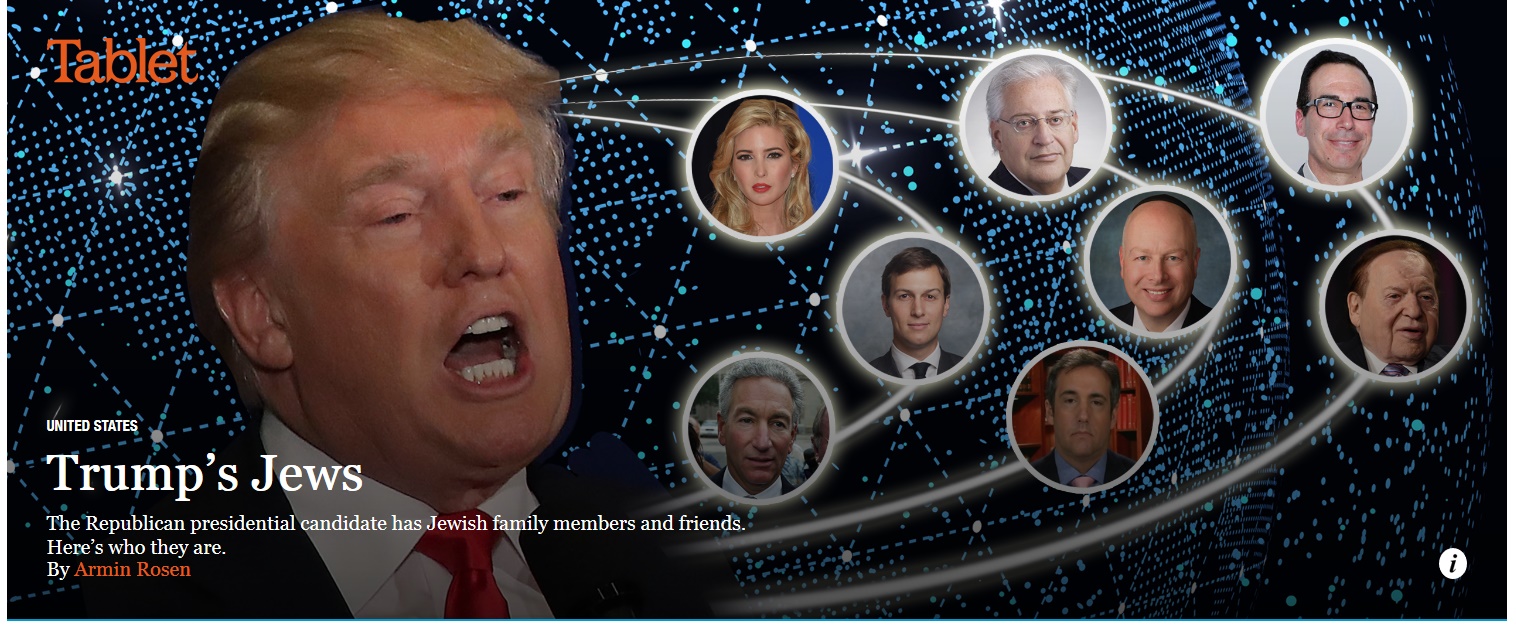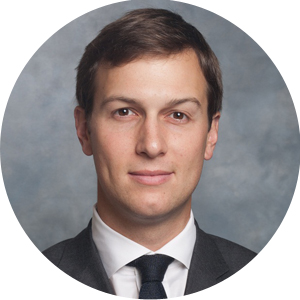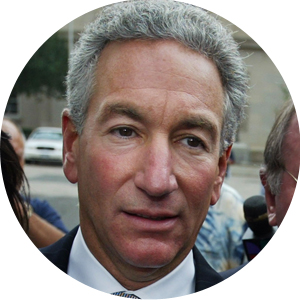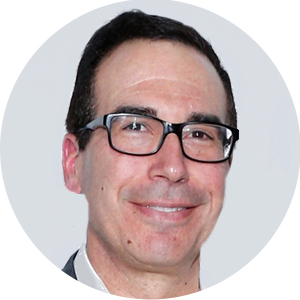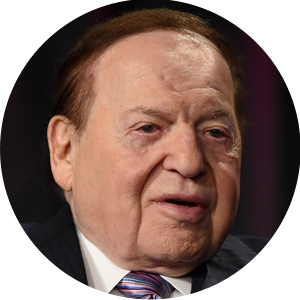- Back to our
section with articles on Donald Trump and Jewish-Israeli
influence and power
- Pictures of
Donald Trump with his
Jewish-Israeli masters

-
Cartoons/Caricatures on Jewish Power,
Donald Trump and U.S. Politics

- Back to our
section with articles on Jewish-Israeli
influence and power in U.S. politics
-
Photos of
World Leaders Manipulated by Jews

Trump’s Jews
The Republican presidential candidate has Jewish family members and friends. Here’s who they are.
It’s been decades since a major party presidential candidate had a harder case to make to American Jewish voters than Donald Trump. Trump has supported policies that sit uneasily with American Jews, and shown what some deem to be an alarming tolerance for anti-Semitic supporters and even a tone-deaf enthusiasm for some of their iconography. At the same time, Trump is the father of an Orthodox Jew and counts Jews among his closest advisers and supporters. Few other serious presidential candidates have had as up-close or as personal an experience with Jews or Judaism.
That familiarity isn’t going to make it any easier for him to build on the 30 percent of the Jewish vote that Mitt Romney received in 2012. During the primary season, Trump distinguished himself from his rivals through taking maximalist stances on immigration enforcement, particularly relating to Muslims and refugees from the Syrian civil war. American Jews are not only politically liberal, but they are also sensitive to the dangers that vulnerable minority populations face both inside the United States and beyond. For some Jews, Trump’s proposed ban on Muslims entering the United States recalled earlier American movements to limit Jewish immigration or to scapegoat American Jews for the country’s social and political ills.
And then there’s the steady pattern of anti-Semitism-related incidents that have somehow involved the Trump campaign, a trend that continues to this day. There was Trump’s hesitance to reject the support of anti-Semitic former Ku Klux Klan Grand Wizard David Duke; his failure to condemn supporters who had been sending anti-Semitic death threats to journalist Julia Ioffe after she published a profile of Melania Trump in GQ; his habit of re-tweeting white supremacists; and his use of the slogan “America First,” which has an anti-Semitic provenance. Most recently, there was his promulgation of an anti-Semitic anti-Hillary Clinton image that originated in a white nationalist web forum. At the very least, Trump has not appeared to be all that reflective about his campaign’s success in attracting vocally anti-Semitic supporters.
On the other hand, Trump has an intimate familiarity with Jewish practice and Jewish life. His daughter, Ivanka, converted to Orthodox Judaism in 2009; if elected, Trump would be the first president to be the parent and grand-parent of observant Jews. Ivanka’s husband, real-estate magnate Jared Kushner, is an Orthodox Jew and one of Trump’s top advisers. The Trump Organization’s longtime chief financial officer and general counsel are both observant Jews, and Trump has the support of perhaps the single most important political donor in the American Jewish world—Las Vegas casino mogul Sheldon Adelson. Though he is a deeply repellent political figure to many American Jews, Trump can plausibly claim that Jews and Judaism are closer to the center of his life and work than they are for his opponent, former Secretary of State Hillary Clinton.
Trump’s favored Jews have a seemingly limitless confidence in their benefactor’s personal qualities. The Trump they know is decisive, serious, tolerant, and generous, and they’ve formed their impressions out of years or even decades of personal experience with the man. Despite this special access, their belief in Trump himself—which is often independent of any deep ideological kinship—helps demystify exactly why the real-estate developer, who is so blatantly and viscerally unpalatable to tens of millions of Americans, appeals to tens of millions of others.
The Trump Jews also hint at some of Trumpworld’s defining organizational tendencies. With the possible exception of Sheldon Adelson, every one of the major Trump Jews has known Trump for years, is personally friends with Trump, or is connected to his family through marriage. One of Trump’s Jews is known to be a registered Democrat. One of them was a leading Democratic donor who has a tortured history with one of Trump’s most dedicated surrogates.
Trump’s Jews reflect the importance of personal loyalty within Trump’s political and moral universe—as well as a certain degree of diversity in ideology and background among the people who have come to believe in him the most. They can be divided into three circles of influence, which, save for the candidate’s daughter Ivanka, don’t overlap all that much: the loyalists of the Trump Organization; the moneyed political world around candidate Trump; and the candidate’s family. Of those circles, it seems fair to say that the Trump organization people have been with Trump the longest, while his family possesses the most direct influence with the candidate.
***
THE TRUMP ORGANIZATIONJason Greenblatt
Just four months months ago, Jason Greenblatt was the Trump Organization’s general counsel and one of the company’s top in-house legal officers. Today, Greenblatt, who has worked for Trump since the mid-1990s, is one of the candidate’s top advisers on Israel and Jewish affairs and the campaign’s primary liaison to the Jewish community. When The Forward declared a 24-hour moratorium on Trump-related coverage on June 20, to protest Trump supporters’ online bullying of journalists, Greenblatt wrote the campaign’s response. And when controversy erupted over Trump’s use of an image of Hillary Clinton that had originated on a white nationalist web forum, Greenblatt defended the candidate in the Washington Post, citing his own experiences with Trump. “The clearest refutation of the claim of anti-Semitism, or the claim that Mr. Trump is someone who encourages, condones or panders to anti-Semitic behavior, is his lifelong embrace of the Jewish people and his record of staunch support for Jewish causes and Israel,” Greenblatt wrote.
Greenblatt, who is an Orthodox Jew, told Tablet that Trump has never made an issue of his Sabbath observance, letting him break for Shabbat during in-progress real-estate negotiations and accommodating his family’s Sabbath observance during visits to Mar-a-Lago. In Greenblatt’s view, any perceptions of anti-Semitism among Trump or his supporters are the result of distorted media narratives and not any anti-Jewish bigotry that’s endemic to the campaign. “That unease is misguided and misplaced,” Greenblatt says of Jewish nervousness toward Trump’s alleged dalliances with anti-Semitism. “I hope that people will figure that out. I think truthfully it’s the responsibility of everybody to figure it out.”
Greenblatt had never worked in politics until Trump made him a campaign adviser, and he has no formal background in Middle East policy. “I’m not a political guy,” he explained. “I’m only involved in politics now because of who I work for.” His motivation in his new line of work, he said, stems largely from his confidence in Trump’s personal qualities, which Greenblatt has witnessed up close for over two decades. “You’re not just working for a giant organization,” Greenblatt says of the experience of working at Trump Tower, “you’re working for a human being. At a bank, or an investment bank, a law firm, you’re working with a bunch of people who work for a nameless, faceless organization. Here, you are working for a large company, but Donald is the guy.”
David M. Friedman
Friedman, a bankruptcy attorney who first began working for Trump roughly 15 years ago and who represented Trump during bankruptcy proceedings related to Trump-branded business ventures in Atlantic City, is the real-estate developer’s other top-ranking Israel adviser, along with Greenblatt. Haaretz named him as “the lead candidate” to be Trump’s ambassador to Israel. A former columnist for the right-wing Israeli website Arutz Sheva, Friedman is highly skeptical of the two-state solution. He is president of the American Friends of Bet-El, which is a West Bank settlement that sits just north of Ramallah and that is unlikely to remain under Israeli control in the event of a peace agreement with the Palestinian Authority.
Friedman, who has organized philanthropies in Israel and owns a home in the country, told Tablet that he believes that the legality of the settlements is still an open issue: “When Hillary Clinton and Barack Obama say settlements are illegal, that’s hardly a neutral position, especially given the fact that the legality of the settlements is highly debatable,” he said.
As a two-state solution skeptic and a supporter of one of the more politically thorny West Bank settlements, Friedman fits the profile of someone who might be concerned over the possibility of the United States taking a more “neutral” approach to the Israeli-Palestinian conflict, something that Trump repeatedly advocated during the primary campaign. But Friedman believes that Trump’s endorsement of “neutrality” was anything but a slight against Israel. In his view, “neutrality” just meant brokering peace discussions without imposing preconditions on either side.
“To the extent that he thought there’s an opportunity to do some good, he’s only going to get involved if he thinks he can be helpful,” said Friedman of a future President Trump’s approach to the peace process. “He’s not going to be involved just to satisfy his ego, which is what Kerry and Obama were doing over the last year.” When asked whether he worried that he might be helping to elect the man who could negotiate Israel’s evacuation of Bet El under a final peace agreement, Friedman said, “I don’t have that concern because I just don’t think it’s a realistic outcome in the current environment.”
Like Greenblatt, Friedman does not think that the Trump campaign has become a locus of anti-Semitism. He believes that media coverage of anti-Semites’ support for Trump ignores the existence of left-wing anti-Semitism, and its alleged proximity to Hillary Clinton’s campaign.
“What do the Black Lives Matter people really think about Jews? What does the far left really think about the Jewish people? How much would you trust somebody who’s chanting a slogan about murdering police officers? Can you really think that the BDS movement is just a political movement or do you really think that it’s an anti-Semitic movement?” asked Friedman, when I spoke to him in late June. “Now, I for one think it’s an anti-Semitic movement, and I think the far left is just as anti-Semitic if not more so as the far right. But for some reason, whether it’s Bernie Sanders or Hillary Clinton, they seem to get a pass on their support from the far left without anybody’s accusing them of harboring anti-Semitism within their campaign.”
Michael Cohen
Trump’s special counsel and executive vice president wasn’t able to vote for his boss in New York’s April 19 Republican primary—Cohen is a registered democrat. A decade as Trump’s primary spokesperson, gatekeeper, and personal lawyer have put him at the center of Republican presidential politics.
Cohen, whom ABC news once described as Trump’s “pitbull,” speaks in a sharp New York brogue, and has something of a prickly reputation, as is arguably appropriate for someone acting as a first line of defense for such a controversial public figure. It’s a perception that Cohen apparently relishes: “If somebody does something Mr. Trump doesn’t like, I do everything in my power to resolve it to Mr. Trump’s benefit,” he told ABC in 2011. “If you do something wrong, I’m going to come at you, grab you by the neck, and I’m not going to let you go until I’m finished.”
This approach has occasionally gotten Cohen’s candidate in trouble—early in the campaign, Cohen threatened to ruin the life of Daily Beast reporter Tim Mak if he wrote about Trump ex-wife Ivana’s 1989 accusation that Trump had “violated” her during sex, which she stated in a deposition related to their early-1990s divorce. In conversations with Mak, Cohen repeatedly claimed that legally there is no such thing as spousal rape. Trump stuck by Cohen throughout the ensuing controversy.
When reached by phone and email this week, Cohen emphasized Trump’s “close connection to the Jewish people,” noting that his father, the real-estate developer Fred Trump, “was also highly recognized and praised by the Brooklyn/Queens Jewish communities.” Cohen took strong exception to linkages between his boss and anti-Semitism. “Nothing angers me more than the disgraceful liberal medias’ blatant mischaracterization of Mr. Trump as a racist,” Cohen wrote by email. “As the child of a Holocaust survivor, racism was never permitted in our home and I would never work for someone with those tendencies. Would a racist attend both of my children’s Bat and Bar Mitzvahs? Would he make a Jew an executive at his company and task that person to protect him, his company, and children? Anyone who believes for even a split second that this is true is too ignorant to engage in conversation. He is a great man and will live up to his mantra of making America great again!”
As Cohen explains, Trump also has simple, utterly non-bigoted criteria for evaluating people. “Mr. Trump treats all people exactly the same regardless of race, religion, creed or color,” he wrote. “Complete the task to his satisfaction and you are praised. Fail the task, well … you know what happens.”
THE FAMILYIvanka Trump
The 34-year-old daughter of Ivana and Donald Trump is one of the Trump campaign’s most important centers of power. Ivanka was reportedly the driving force behind the removal of former campaign manager Corey Lewandowski last month. Ivanka was said to be “very impressive” during her individual meetings with senators after Donald Trump’s awkward and occasionally hostile sit-down with congressional Republicans on July 7, a meeting that reportedly included a “tense exchange” between Trump and Arizona Sen. Jeff Flake. As the New York Times reported in April, Ivanka holds “an exalted position in the family, in their company, and even in the campaign,” serving as a trusted adviser and a “surrogate political spouse,” in light of Melania Trump’s aversion to the campaign trail. On the business side, Ivanka has negotiated the Trump Organization’s acquisition of a luxury golf resort in Miami and its renovation of the Old Post Office complex near the White House.
Ivanka converted to Orthodox Judaism in 2009 under the guidance of influential Orthodox Rabbi Haskel Lookstein, before marrying the real-estate developer Jared Kushner. According to both Michael Cohen and Jason Greenblatt, Ivanka is a Sabbath observer; Cohen says she keeps “glatt kosher.” While Donald Trump has never undertaken any business projects in Israel, David Friedman told Tablet that he accompanied Ivanka to Israel “a few years ago” to “look at some hotel properties” (although “nothing tangible” came of the trip).
Ivanka almost never talks about her conversion to Judaism in public, but she briefly touched on the subject during a 2015 interview with Vogue. “It’s been such a great life decision for me,” she said of her conversion. “I am very modern, but I’m also a very traditional person, and I think that’s an interesting juxtaposition in how I was raised as well. I really find that with Judaism, it creates an amazing blueprint for family connectivity.”
Jared Kushner
When the now-35-year-old son of Charles Kushner married Ivanka Trump in 2006, he probably had little idea that the union would eventually turn him into one of the top players in American politics. According to a July New York Times report, Kushner is one of Trump’s closest advisers and serves as a de-facto campaign manager, brokering high-level meetings and mapping out damage control strategies after incidents like the Hillary Clinton-Jewish star tweet. He reportedly authored much of Trump’s well-received AIPAC speech from this past April, the first of the campaign in which the Republican candidate spoke with the aid of a teleprompter. Kushner is also the owner and publisher of the New York Observer, which endorsed Trump before the New York primary in April, in an editorial with the unforgettably frank opening: “Donald Trump is the father-in-law of the Observer’s publisher. That is not a reason to endorse him. Giving millions of disillusioned Americans a renewed sense of purpose and opportunity is.”
The opening lines hint at the tensions embodied in Kushner’s role within the campaign. Kushner is the young, clean-cut face of one of the New York area’s most notorious real-estate clans—someone who could make the Forbes 40-under-40 list and close $2 billion in transactions in 2014 alone, despite his family’s well-documented troubles. At the same time, he’s connected by marriage to what many would already view as an inherently sordid enterprise, namely Donald Trump’s presidential campaign.
This tension burst into the open on July 5, when Dana Schwartz, a writer with the New York Observer, used the website of Kushner’s paper to criticize her boss for defending Trump against charges of anti-Semitism, and attaching himself to a presidential candidate who had galvanized legions of Jew-haters. On July 6, Kushner used the Observer to argue that “my father-in-law is not an anti-Semite,” using his family’s history in the Holocaust and his relatives’ survival of the 1941 massacre at the Novogroduk ghetto, to deflect criticism of Trump after the Hillary-Clinton “sheriff star” incident earlier that week.
Kushner’s defense of his father-in-law didn’t sit well with members of Kushner’s own family. According to Politico, one of Kushner’s cousins took to Facebook to chastise him for using his family’s Holocaust history to argue for the innocuousness of an allegedly anti-Semitic image.
Through it all, Kushner has reportedly tried to steer the Trump campaign in a more restrained and respectable direction. He was reportedly involved in the June decision to dismiss Corey Lewandowski, Trump’s volatile former campaign manager. After his firing, Lewandowski said that Kushner was partly responsible for Trump’s Facebook page, which is one of the campaign’s more disciplined messaging organs.
Charles Kushner
The father of Donald Trump’s son-in-law was a tri-state area real-estate titan and one of the most important Democratic donors in the country. He landed in prison as the result of nearly Shakespearean levels of intrafamilial deceit—and because of the efforts of a federal prosecutor and present-day Trump superfan named Chris Christie.
In 2004, Kushner was investigated for hiding violations of federal limits on campaign contributions, a probe that Christie oversaw while he was the U.S. attorney for New Jersey. Kushner then hired a prostitute in order to blackmail one of the case’s key witnesses, whose wife then informed investigators of Kushner’s attempts at obstruction of justice. To make matters worse, the witness and target of the blackmail attempt was Kushner’s brother-in-law, and it was Kushner’s sister, Esther, who exposed his plot to the feds. The campaign finance investigation stemmed from a dispute between Kushner and his brother Murray, a major New Jersey Republican donor and one of Chris Christie’s most important boosters.
Charles Kushner served 14 months in prison but remained a major philanthropic donor in northeast Jewish circles. In 2015, he donated $100,000 to Trump’s Make America Great Again PAC. Fifteen years earlier, he had been the largest individual donor to Hillary Clinton’s senate campaign.
THE DONORSSteven Mnuchin
Trump’s national fundraising chairman belongs to a group that would seem to be especially unfriendly to the developer’s presidential run: Goldman Sachs alumni. Mnuchin, who now runs his own hedge fund, spent 19 years at the investment bank, where he served as chief information officer between 1999 and his departure in 2002 (Trump used Heidi Cruz’s Goldman Sachs connections to accuse her husband, Ted Cruz, of being in thrall to the financial giant). Mnuchin’s friendship with Donald Trump appears to be his overriding concern here, as he told the New York Times in May: “I was there at the beginning when he decided to run for president, and I’ve been a supporter and quiet adviser behind the scenes to him,” Mnuchin said.
The personal affinity might come from Mnuchin’s colorful business dealings, which mirror Trump’s own craving for celebrity. Mnuchin was briefly co-chair of the now-defunct production company Relativity Media and has helped finance a number of major films, earning executive producer credits on Mad Max: Fury Road, American Sniper, and The Lego Movie. But Mnuchin also shares another similarity with Trump: namely, accusations of engaging in morally unsavory business dealings.
In 2010, Mnuchin was sued by a bankruptcy trustee for allegedly making $3.2 million off of Bernie Madoff’s ponzi scheme. Mnuchin was also chairman of OneWest bank during the height of the foreclosure crisis, overseeing one of the most trigger-happy lenders in the country: OneWest “routinely jumped to foreclosure rather than pursue options to keep borrowers in their homes; used fabricated and “robo-signed” documents to secure the evictions; and had a particular talent for dispossessing the homes of senior citizens and people of color,” according to a New Republic report from this past May.
Public records suggest Mnuchin, who is a former Obama and Clinton donor, hasn’t been all that successful in convincing Republican funders to support Trump’s campaign. Trump’s presidential run raised only $3 million in May, compared to the $72 million Mitt Romney raised in June of 2012.
Sheldon Adelson
The owner of the Sands Casino in Las Vegas was one of the biggest swing voters of the Republican presidential primary. Despite reports that he was leaning toward supporting Marco Rubio—and reports that his wife, Miriam, preferred Ted Cruz—Adelson, who is worth some $26.5 billion and spent over $150 million in political donations during the 2012 cycle alone, did not side with any of Donald Trump’s primary opponents. That didn’t stop Trump from tweeting that “Sheldon Adelson is looking to give big dollars to Rubio because he feels he can mold him into his perfect little puppet.”
Unlike much of the rest of the anti-Trump wing of the party, Adelson has come around to the reality of a Trump candidacy. On May 13, Adelson published an opinion piece in the Washington Post endorsing his fellow casino owner that made curiously little mention of Adelson’s signature issue: Israel. Adelson is also the owner of the free daily Israeli newspaper Yisrael Ha’Yom, which has been attempting to improve Trump’s image in that country.
Adelson is lukewarm on the two-state solution and broke with AIPAC in 2008 over the organization’s support for the peace process. While Adelson might be outside the American mainstream in his coldness toward a negotiated two-state outcome, his views are widely supported within Republican circles: Unlike its Democratic counterpart, this year’s Republican platform does not endorse the existence of a Palestinian state.
***


























